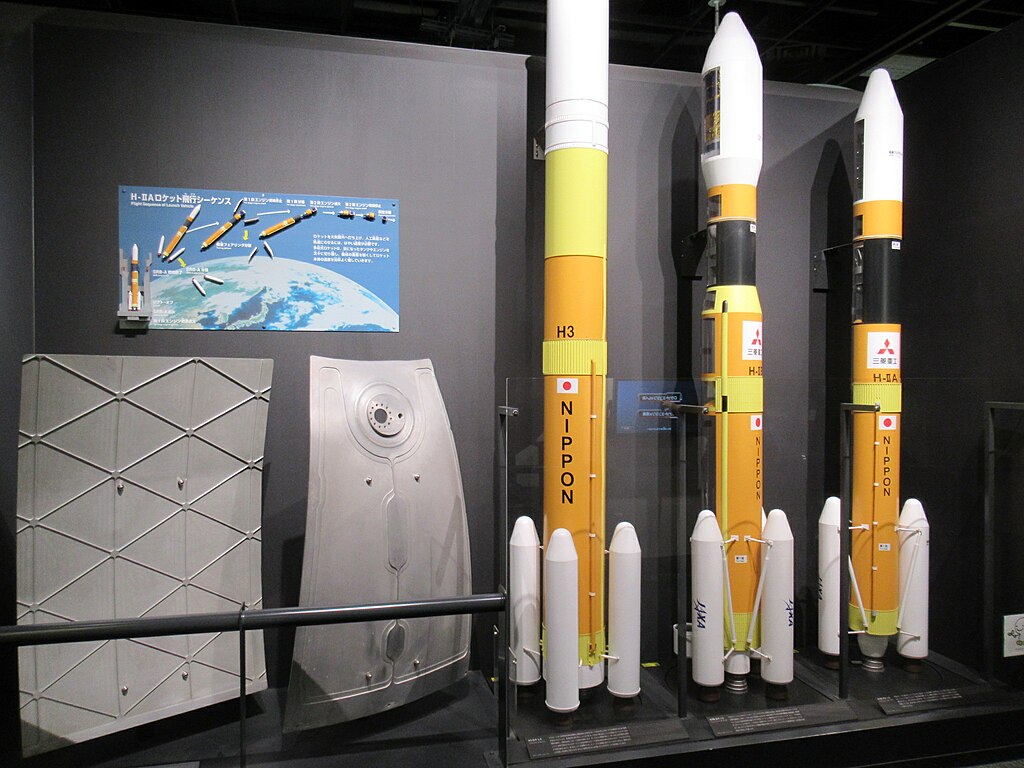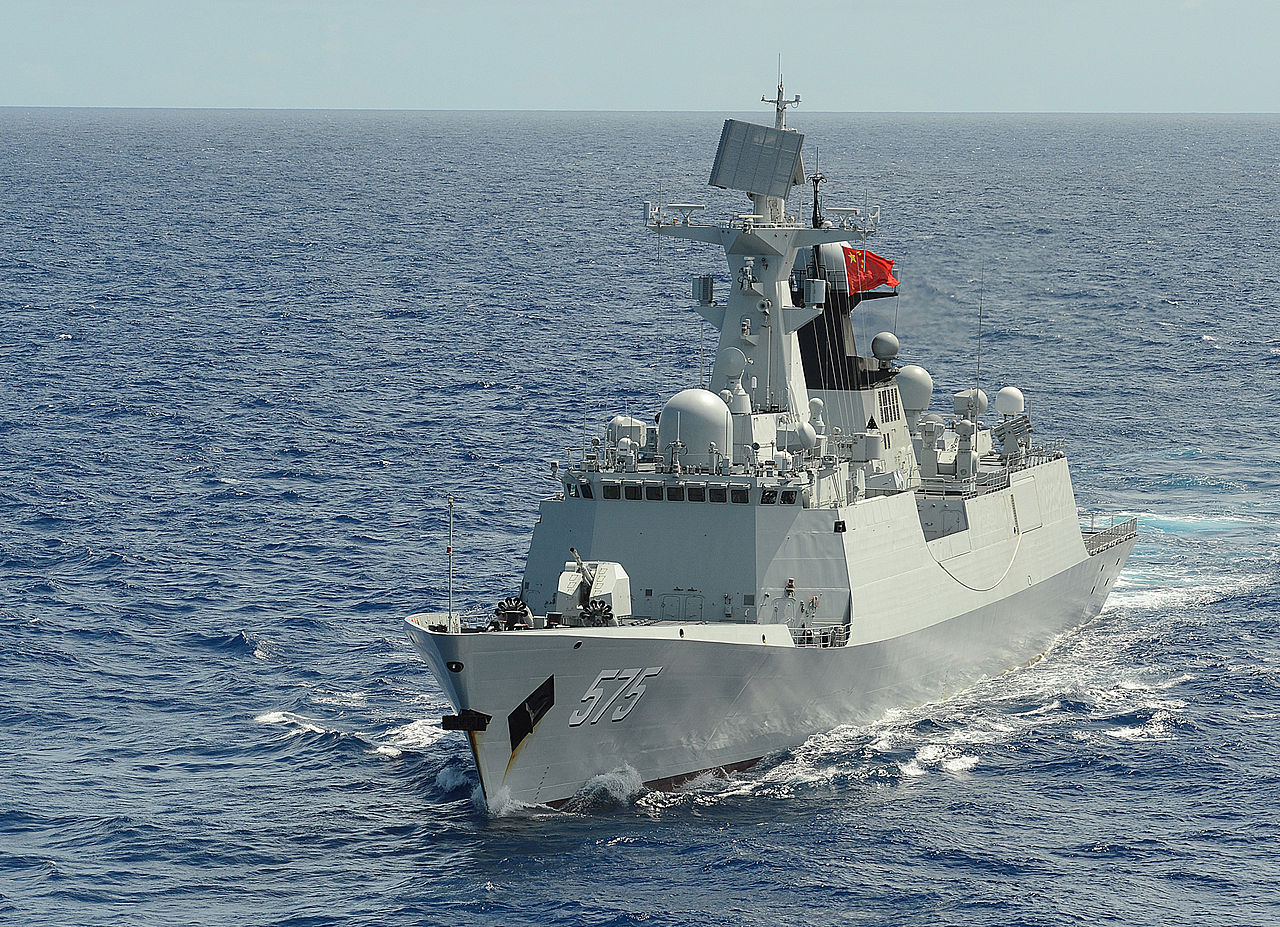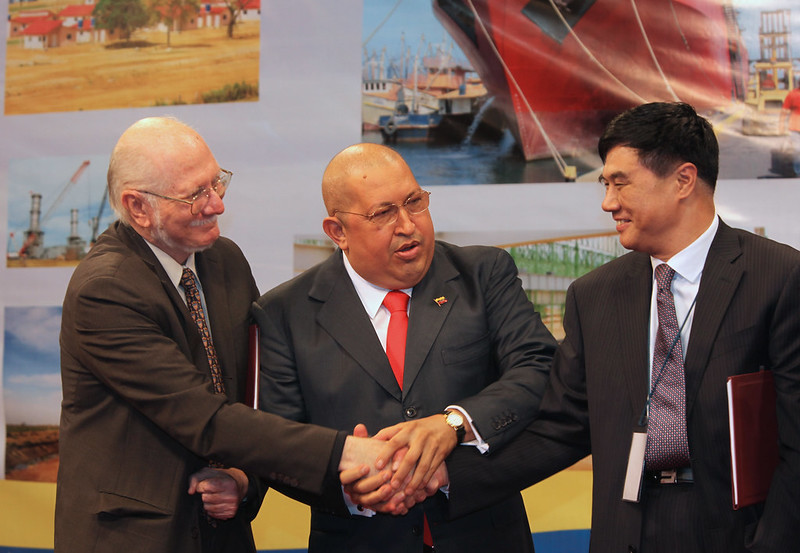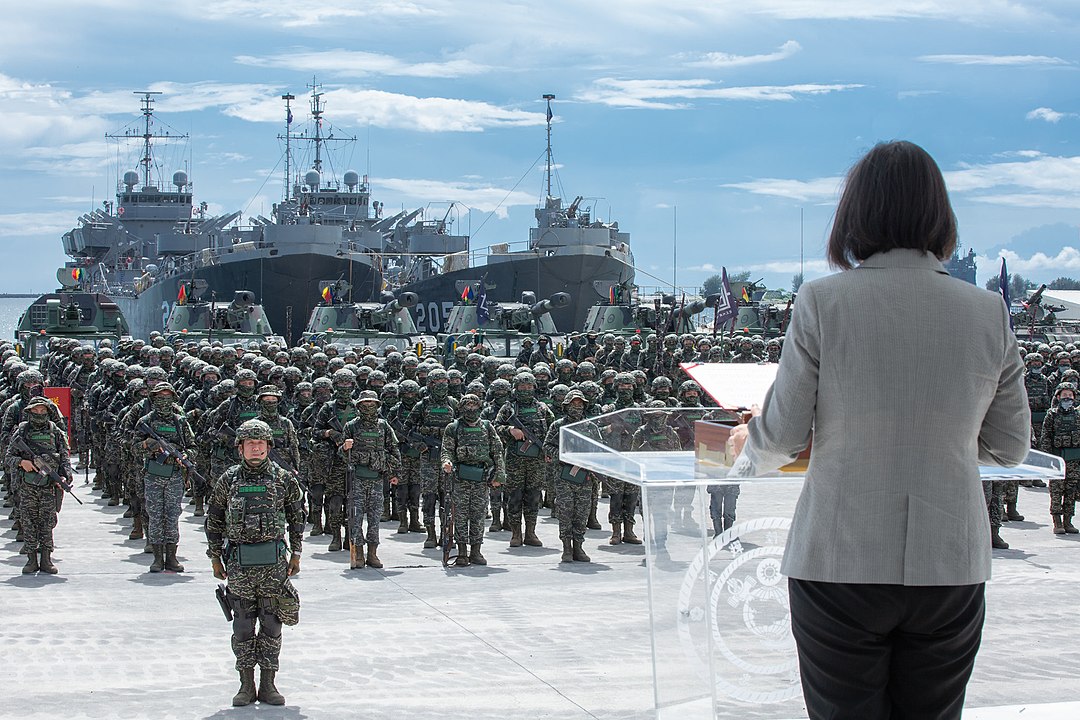
Models of rockets of JAXA, are shown at the Mitsubishi Minatomirai Industrial Museum. Following the launch of one such rocket, CHN has undertaken information operations to achieve its own goals.
“The development of rocket-themed merchandise and culinary offerings has not only diversified Tanegashima’s economy but has also enriched its cultural landscape… “Specialty foods, rocket-themed rice wine, and more have gained popularity among tourists.”
In an effort to advance its goals, the Chinese Communist Party (CCP) uses comprehensive information operations (IO) to influence and shape the global information landscape. The first excerpted article from the official CCP news outlet Xinhua demonstrates a nuanced tactic of CCP’s domestic IO—”喧宾夺主” (“the tail is wagging the dog”). On 17 February 2024, Japan’s flagship H3 space rocket, jointly developed by Japan Aerospace Exploration Agency (JAXA) and Mitsubishi Heavy Industries, successfully deployed two small observation satellites into orbit from the Tanegashima Space Center. While the global media predominantly highlighted JAXA’s breakthrough and Japan’s manufacturing competitiveness, Xinhua’s coverage of the event focused on local Japanese infrastructure and tourism, with the economic revitalization of the Japanese Tanegashima Island taking the center stage. By doing so, the CCP not only obscured the intensified competition in the space race, but also promoted a narrative of fostering a global community united by a shared pursuit of economic growth. The CCP consistently develops nuanced IO tactics targeting the Chinese people during domestic peacetime, distinct from tactics used to aggressively handle domestic upheavals such as the Hong Kong protests and the COVID-19 pandemic. Central to these efforts is portraying China positively as a peaceful and prosperous nation.[i] Overall, the CCP’s approach to global influence carries significant implications for U.S. strategies aimed at countering China’s full-spectrum IO campaign.
Sources:
Guang Yang and Anzheng Li, “在日本种子岛感受火箭经济 (Experience the “Rocket Economy” in Tanegashima, Japan),” Xinhua (official Chinese Communist Party news outlet), 19 February 2024. http://www.news.cn/world/20240219/79f2ea64434e49b6bc512c4f7f80298a/c.html
Japan’s recent launch of the H3 rocket from the Tanegashima Space Center in Kagoshima Prefecture, has not only marked a significant milestone in space exploration but has also underscored the burgeoning “rocket economy” transforming the socioeconomic landscape of Tanegashima Island. This report delves into the multifaceted impacts of the rocket industry on Tanegashima, examining its influence on local infrastructure, tourism, economic diversification, and cultural identity…
Situated in the southern part of Kagoshima Prefecture, Tanegashima has experienced a gradual decline in population over recent decades. The emerging of the “rocket economy” has catalyzed economic and social benefits. Economically, investments in infrastructure, satellite research, manufacturing, and space education have bolstered local revenues and generated employment opportunities. For instance, data from the Japan Economic Research Institute reveals a significant increase in revenue and job creation attributed to direct orders from the Japan Aerospace Exploration Agency (JAXA) and the influx of tourists and business visitors during rocket launch events. Moreover, the social benefits extend beyond economic gains, encompassing talent development, academic research, and regional image enhancement. Tanegashima’s identity as a “rocket launch island” has garnered widespread recognition, with space-themed attractions, such as the Emi Noe Observation Park, contributing to the island’s allure among tourists and enthusiasts. The influx of visitors from across Japan underscores the island’s newfound prominence as a premier destination for space enthusiasts. Furthermore, the development of rocket-themed merchandise and culinary offerings has not only diversified Tanegashima’s economy but has also enriched its cultural landscape. Souvenirs like rocket-shaped keychains and space-themed delicacies reflect the fusion of space exploration with local traditions, captivating visitors and fostering a sense of pride among residents.Japan’s H3 rocket launch not only symbolizes advancements in space technology but also serves as a catalyst for socioeconomic development on Tanegashima Island. The convergence of economic opportunities, cultural enrichment, and community engagement underscores the transformative impact of the “rocket economy” on the local landscape. By embracing its newfound identity as a nexus of space exploration, Tanegashima stands poised to chart a course toward a prosperous and vibrant future.
Notes:
[i] According to a Freedom House report, the CCP is likely to intensify censorship efforts and fortify against the infiltration of Western ideals while launching cognitive warfare to spread authoritarianism in developing countries. See: Sarah Cook, Angeli Datt, Ellie Young, and BC Han, “Beijing’s Global Media Influence: Authoritarian Expansion and the Power of Democratic Resilience,” Freedom House, September 2022. https://freedomhouse.org/report/beijing-global-media-influence/2022/authoritarian-expansion-power-democratic-resilience
Image: Models of rockets of JAXA, are shown at the Mitsubishi Minatomirai Industrial Museum. Following the launch of one such rocket, CHN has undertaken information operations to achieve its own goals.
Source: https://commons.wikimedia.org/wiki/File:Models_of_rockets_of_JAXA,_at_the_Mitsubishi_Minatomirai_Industrial_Museum.jpg
Attribution: Brakeet, CC0 1.0



